God Bless the McIntosh family as they mourn their loss.
This website was created to honor our loved one, J. Paul McIntosh. J. Paul proudly served his country from 1945-1946 as a Sgt T-3 with the 396th Military Police Battalion (Escort Guards).
Tributes
Leave a tributeGod Bless the McIntosh family as they mourn their loss.
Leonard Prusak (from Detroit, MI) in the 396th Military Police Battalion, Company C, during or before '45-'46, probably at Ft. Riley, KS? Leonard was my grandfather. Thanks for your time.
Leave a Tribute
God Bless the McIntosh family as they mourn their loss.
Leonard Prusak (from Detroit, MI) in the 396th Military Police Battalion, Company C, during or before '45-'46, probably at Ft. Riley, KS? Leonard was my grandfather. Thanks for your time.
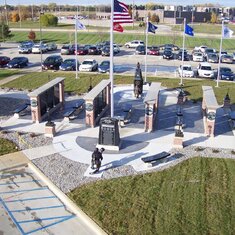
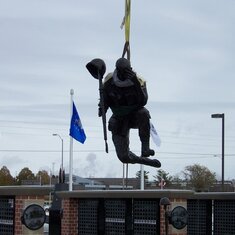
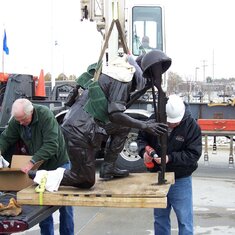
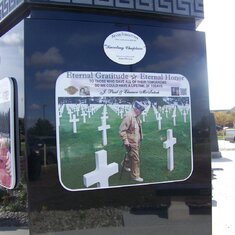
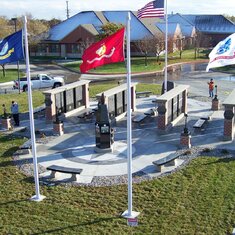
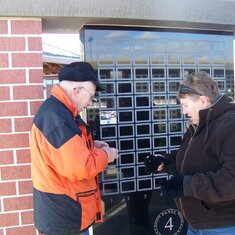
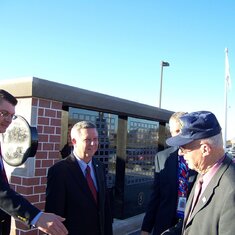
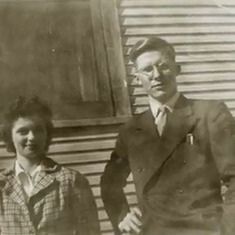
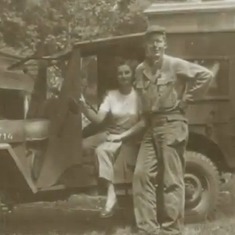
Claude Van Andel
The Claude Van Andel Story
(Why “The Wall” Was Built)
Presented by J.Paul McIntosh
Vietnam Reunion
Divot’s, Norfolk NE, August 13 & 14, 2010
Prelude:
World War II, the war of which I was a part, ended about 65 years ago. Today, I want to tell you the story of a young man from Norfolk, Nebraska who died in a later, and in many ways more difficult, time in our history. This young man died thousands of miles from his Norfolk roots, in the “Green Hell” of Vietnam. And although his life was cut short in a blinding, split-second act of war-time violence, his memory lives on because his life and death became the driving inspiration for the Vietnam “Wall of Remembrance” in Washington, D.C. It is my observation that wartime deaths are random, non-discriminating, sometimes surprising, always shocking, and never forgotten, by those who were there. Historically, American soldiers have fought, and sometimes died, to stop power-hungry tyrants from inflicting conditions of living that may be worse than death. Today I want to tell you about a young man from Norfolk,Nebraska, whose life and death impacted people who didn’t even know who he was when he died. Although this event happened over 40 years ago during the Vietnam Conflict, the memory still resonates.
(Original talk first presented to the Norfolk Men’s Prayer Breakfast in 1986)
As all of you know, war has never been a very pretty thing. As you might expect, it can bring out the very worst in people. But, illogical as it seems, it often brings out the very best also. History is replete with the stories of unsung persons who, by word or action, changed the outcome of events. We used to call them heroes. There are thousands of these stories, mostly unknown and generally untold, sometimes tragic, and always very personal.
Today I am going to tell one of these stories. The young man of this story graduated from Norfolk High School in 1967, a member of the last graduating class in the old high school. He was gregarious, fun-loving, and active in several areas, including drama and music. After graduating from high school, he went on to Norfolk Junior College for one year, then, somewhat bored with school, and with his father’s encouragement, signed up for the Army, which he entered in May 1968. After basic training, he was sent to the war in Vietnam, where, because of his ability and personality, he became a natural leader whose influence went far beyond his rank as a Sgt. in charge of Search & Destroy missions. He was wounded at least once, had malaria once, but seemed to live a charmed life. Although he was surrounded by the green hell of Vietnam, which reduced a few American soldiers to the animalistic state often depicted in the movies or on TV, this young man from Norfolk,Nebraska never lost track of who he was, and he became a sort of “role model” for many of the other young men who knew him. But on May 27, 1969, one year after he joined the Army, on a mission 75 miles north of Saigon, this young man was killed in action. His name was Claude Van Andel. And if you go to the Vietnam Memorial Wall in Washington, D.C., you’ll find his name on the left side of the “V” of that memorial, on Panel #23, about nine feet up on Line 4. It is also on the granite Veterans monument in Prospect Hill Cemetery in Norfolk along with the names of six other young men from this area who died in that war.
And I suppose that is where the story would have ended, except for something that happened which was so strange that the young lady to whom it occurred, told only her father and her roommate.
And now, as Paul Harvey would say, “You’re going to hear, the rest of the story” and why it took 17 years to be found out.
You see, Claude had a special friend in high school named Janet. No, they weren’t lovers, but there was a special bond of friendship, which allowed them to be totally open and honest with each other. It was the kind of relationship, which sometimes happens, in which you don’t have to speak, because each one already knows what the other is thinking. Because of this, Claude and Janet just enjoyed being around one another and were even cast in the lead roles of Mammy and Pappy Yokum in the musical presentation, “Li’l Abner.”
In any case, after graduating, Claude went to Norfolk Junior College and Janet went to the University at Lincoln. The next summer he enlisted in the Army and after basic training came home on leave before being shipped over to Vietnam. Just before going back to camp, he took time to go to Lincoln to visit his good friend Janet. His family and his girlfriend never quite understood why he’d taken a precious day of leave just to visit a classmate in Lincoln. He told Janet he was being sent to Vietnam and they reminisced about the old times in Norfolk and some of the crazy things they used to do, like sneaking into the Drive-In Theater on $1 night by hiding in the trunk of the car. As he was leaving Claude said, “Well, this might be my last good-bye, I may never come back.” Janet quickly responded with something like, “of course you’ll be back; this is just ‘so long’. You’ll have to come back to tell me ‘Good-bye’.”
He left and then on May 26, 1969, as Janet was studying for the final semester exam in English 162 in her dormitory room, suddenly Claude was there saying, “I came back to tell you goodbye.” And then he was gone. Shocked out of her shoes, she looked at the clock; it was between 11:15 and 11:20 p.m. She hadn’t been asleep . . . she hadn’t even been thinking of Claude . . . she’d been studying English (Emerson, as in Ralph Waldo Emerson). This was crazy. There was nobody there, and yet he had been there, she had seen him and he had said, “I came back to tell you good-bye.” Was she losing her mind? But no, she had not been asleep and everything was perfectly normal and she could think rationally and logically. She knew it was neither rational nor logical, and yet Claude’s presence had been real and his words had been clear.
With her heart pounding, she picked up the phone and called home. “The strangest thing just happened,” she said and proceeded to tell the story. As I listened (yes, I was the father), I realized that this was one of those relatively rare events where two people communicate in ways noticed but not understood by science. We talked a long time and I assured her that no, she hadn’t lost her marbles, that she had probably just experienced something that most of us would never experience, and yes, Claude was probably either dead or at least mortally wounded. After a long time she hung up, but about 3:00 in the morning called again. She couldn’t go to sleep. She had talked with her roommate, but the contradiction between what had happened and the logic that it couldn’t have happened kept nagging at her. I promised to discreetly check in the morning with the Van Andel’s, which I did and of course, all was well with Claude as far as anyone knew. Naturally, Janet didn’t or couldn’t discuss this with anyone else.
Two days later the Van Andel’s were notified of Claude’s death.
In due course, the body was returned to his parents in Norfolk, but the casket was kept sealed, and despite tearful pleas by the family, the casket remained sealed, nor was any explanation given by the Army. Another Norfolk G.I. in ‘Nam wrote that he had heard that Claude had been killed by a sniper’s bullet, but the family never knew for sure. Eventually they came to believe that it wasn’t Claude in that casket at all, that really Claude was M.I.A. (missing in action). But in any case, the funeral was held at Christ Lutheran Church and the body was buried in Hillcrest Cemetery up near the top of the hill. And there it would have ended, with the family increasingly bitter—at the Army… the war . . . our Government . . .and yes, even among themselves. The parents moved to another state still convinced that Claude was out there somewhere, and Janet was left with a story she dared not talk about to most people.
Then in May 1985, the National Geographic had a cover story about the erection of the Vietnam Memorial and it referred to the book, “To Heal a Nation”, written by Jan Scruggs about his long struggle to put up a fitting memorial to those who died in Vietnam. (Most of you probably know Jan Scruggs, who has attended several Vietnam functions in Nebraska, including right here in Norfolk.) It told of the mental anguish that Scruggs suffered, because after the war, he found he couldn’t contact many of his former buddies or their families because all he knew was their nickname or maybe their first name. You see, if your buddy gets taken out, it is a lot less traumatic if you aren’t too close. And, because of the attitudes of the public toward the Vietnam War, most veterans felt they could not express their feelings except to other ‘Nam vets. Now if the Vietnam veterans didn’t remember the names, who would? The wall—and the names—were the result.
For over a year, Janet tried to find that book, because she somehow felt she must. Finally, in September of 1986, she found a source and ordered one. When it came, she couldn’t bring herself to read it for a long time, and then one day she read it in one sitting, and called me.
There on page 96, when Scruggs was ready to give up on the Memorial, it was the memory of “Claude, a young G.I. fromIowa” that kept him going. Janet said, “I just know that this is Claude Van Andel, in spite of what the books says.” She was still convinced (as was I) that there was something special about Claude’s death, even though the family still didn’t accept it.
In the back of the book there is a list of over 58,000 names of all those killed in Vietnam. Janet painstakingly went through every one of those 58,000 names and did not find one, single “Claude” from Iowa. So she did it again—still no “Claude” from Iowa. She was so sure that finally she had found part of the answer that she called Claude’s sister, Nancy, and told her what she had found. Nancy had just returned home from the Church where she had taken flowers—it was October 3rd, Claude’s birthday.
It was a mission now. She wrote a letter to Jan Scruggs, the man behind the Vietnam Memorial, and in it she described the story of her experience and her feeling that “Claude” of the book was, in fact, her friend. She didn’t know where Scruggs might be, so she sent a cover letter to the publisher asking them to forward it to Scruggs.
Several weeks passed, and then one night she got a telephone call. It was Jan Scruggs, and after receiving her letter, he had checked the dates and the records for May 27, 1969, and indeed it was their friend, Claude Van Andel. Scruggs only remembered Claude was from out here someplace like Iowa or Kansas or somewhere. It was Claude’s death and the fact that Scruggs couldn’t remember Claude’s last name, and that the others could only recall a nickname of persons that were so dear in battle, that had prompted him to build a memorial where all the names could be seen, and never forgotten.
Scruggs then told her that he had been the radio-man of the mortar platoon behind Claude’s point squad when he heard Claude call back to their commanding officer that he had spotted what looked like the blue-green trip wire for a Claymore mine. He thought they were walking into a trap. Their regular C.O. had just been hospitalized, and the new Captain, fresh from command school, radioed back that it was probably just a decoy and to continue forward. About one minute later, there was a loud explosion, and a furious firefight. When it was over, Scruggs had called in helicopters for the wounded, and he and the others gathered up what was left of Claude, and placed the parts in a body bag. The regular point man apparently hadn’t been able to go on, so Claude had taken his place and was walking point and had taken the full blast of a 40# Claymore. There were 25 or 30 holes in his machete alone. Claude was the first American that Scruggs had seen die, and the sheer horror of it never left him. Scruggs himself was wounded and evacuated the next day.
Now Janet asked the question that had haunted her for over 17 years. When did it happen? After some calculations, Scruggs could only place the time somewhere between 11:00 and 11:30 p.m. Lincoln time—but, of course she knew the exact time.
About three weeks later in Scarsdale, New York, Scruggs was part of a seminar designed to help Vietnam Vets cope with their problems. He had been so taken with Janet’s experience and the connection with Claude, that he told the story to the group. During the break after his talk, a young priest came to the speaker’s platform and asked, “Do you remember me? We’ve met before.” Scruggs said, “No, I don’t remember.” And the priest said, “I’m Charlie Fink, the point man who couldn’t go on. I helped with Claude’s body. Can you believe I’m Father Fink now?!”
That night, Father Fink called Janet and told her of his meeting with Scruggs. He also told her how, as the newest replacement on the squad, he had been put on ‘point’, hacking his way through the underbrush till they had come to a small clearing where Claude had spotted the trip wire. They stopped; Claude radioed the C.O., who ordered them forward. Young Charlie Fink, a kid far from his home in Brooklyn,N.Y., was now not only exhausted, but paralyzed with fear. The young man from Norfolk, Nebraska could have ordered anyone of his platoon to take point, but he didn’t. Perhaps he knew whoever did it faced almost certain death. Perhaps he thought with his experience he could cut the trip wire before the Cong yanked it. Whatever his reasons, he ordered Fink to cover him while he went forward as point. A few short steps and a large Claymore mine exploded almost in his face, and when the firefight was over, a dazed and shaken Charlie Fink realized he was alive because Claude Van Andel had taken his place on point. And aimless Charlie Fink, the kid from Brooklyn, because of this most personal example of ‘Greater love has no man, than he who lays down his life for another,’ found direction and dedicated the rest of his life to others, as a Catholic priest.
Later Father Fink wrote a letter telling about the kind of person Claude was. I’d read it to you, but I tend to get a little choked up when I do that. I will make a copy of part of it available to you if anyone is interested.
As a result of all this, Scruggs invited Father Fink to give the invocation and homily at the Vietnam Wall Memorial Day Service in 1987. He also invited Janet and myself to be guests at the service. While there, we met others from Claude’s group, including Peter Jonleviti, the regular C.O. who was hospitalized that fateful day. They all agreed that if Peter had been there, Claude would probably be alive today. And former Lt. Peter Jonleviti, who worked for Coors Brewing Company started a scholarship program for Children of Vietnam Vets in honor of Claude Van Andel.
I took a two-hour video of that Memorial Day 1987 at the Vietnam Wall and one of my proudest moments was when Jan Scruggs, on national T.V. said, “This Wall is dedicated to Sgt. Claude Van Andel and all the other young men who gave their lives in that conflict.”--- As Father Fink wrote, “The war killed him, but never destroyed him.” Janet showed this video to Claude’s sister Nancy, and then, at long last, the healing began for them. Nancy Van Andel is now Dr. Nancy Stelter, a nationally known consultant, who is with us here today. Janet is now Jan Einspahr, an attorney in Norfolk.
And now you, too, know ‘the rest of the story.’ That the life (and death) of a young man from Norfolk,Nebraska was the initial inspiration for the Vietnam Memorial in Washington D.C. Nebraskans ought to be proud.
(Epilogue – A Personal Requiem)
As you can imagine, Claude’s death was very difficult for me to accept, as it opened old memories of my own generation, and some of the fine young men (on both sides) who never made it home. Over the last 65 years I have often thought of the life that they missed out on, and how random it was that they happened to be in the wrong place at the wrong time, instead of me. Over time I came to realize that one of the motivating factors that drove my life after the war, was a subconscious effort to make up for friends, classmates and buddies who never had a chance to fulfill their own lives. It seemed to me that if God gave me the privilege to be untouched, the least I could do is to be thankful and grateful and try to make up to society for the things my departed friends (and countless innocent men, women, and children) could not do. After all, it could just as well have been me instead of them. Claude’s death, and the manner in which it happened, hit me like a hammer. He was one of those whose potential contributions to society was lost in a split second of time. Yet this is part of the price of democracy. We will remain free only as long as citizens are willing to lose it all rather than have their countries’ freedom stifled. I apologize for rambling, but I believe that America will continue to be great only as long as each generation remembers those who willingly put their life in harm’s way, and resolve, as Lincoln said, “that these men shall not have died in vain, and this Nation, under God, shall not perish from the Earth.
J. Paul McIntosh may be contacted at:
P.O. Box 1366,NorfolkNE 68702
Cell Ph: 402-649-0246 or Office Ph: 402-371-1380
jpaulmcintosh@hotmail.com or jpmcintoshenterprises@hotmail.com
Excerpt from a letter to Janet (McIntosh) Einspahr written by the man whose life was saved by Claude Van Andel on May 27, 1969, the day Claude was killed.
..…I only knew Claude two months – that’s how long I’d been in Vietnam when he died – but in that time, I never saw him do a brutal thing; I never met anyone who didn’t like him; I never heard him doing anything he’d have reason to be ashamed of. I had heard that he’d had malaria, and I knew he was a short-timer, i.e. he didn’t have much time left in ‘Nam. If he had pressed the issue, he might have been able to get a safe job the last couple of months in the rear. He wasn’t the type. He was my squad leader. He could have left me exhausted on point May 27, or assigned someone else. He wasn’t the type. What happened isn’t fair; it’s lousy. And I wish I could bring Claude back and take away all the pain his family and others who loved him have experienced. But I can’t, of course. My consolation is that I’m a Catholic priest and really do believe in what I preach, even if I’m not as good at living it. And part of what I believe is that though God’s ways are mysterious, they’re not malignant. I believe, therefore, that Claude is with God, in a better place than we inhabit, that someday, if we’re as selfless as he was, we’ll be with him again.
I knew many men like Claude; good young men, not perfect, by no means choirboys, but good and decent. They came to Vietnamthat way. Most came home that way. Some died that way. It really bothers me to think that thanks to a movie like Platoon, it will be widely believed that we were all quickly reduced to animals. Claude was not. I wish you could have seen him on the day he died: blond and boyish, his sense of humor intact, grubby like us all, sick of war, but good and charming and wholesome. The war killed him, but it never destroyed him.
I hope you’ll share this letter with anyone who knew Claude, if the occasion ever presents itself. And I hope you’ll be at peace about his soldiering and his passing.
God bless and keep you always,
Sincerely,
Charlie Fink
2012 Philanthropist of the Year
http://www.youtube.com/watch?v=Lt2kYm46GUA
J. Paul & Eleanor McIntosh - short video about giving.
J. Paul & Eleanor McIntosh College of Nursing
http://www.youtube.com/watch?v=xqX5Hi-sHJI&feature=em-share_video_user
Classes begin on August 16, 2010 at the J Paul and Eleanor McIntosh College of Nursing. The college is a unique partnership between the University of Nebraska Medical Center and Northeast Community College in Norfolk, Nebraska. Students can earn degrees either from NECC or UNMC, from CNA certificates to PhD's in nursing. The VIP open house was attended by a variety of Nebraska's community, government, business, and educational leaders including Governor Heineman, Nebraska Legislature Speaker Mike Flood, University of Nebraska President James Milliken. The college was funded by more than 200 donors throughout the state who gave more than $13M to build the state-of-the-art teaching facility. The McIntosh's gift of well over $1M was the "capstone" donation. Mr McIntosh served on the NECC Board of Governors for 19 years. Their daughter, LaRayne McIntosh Horn, was an instructor at the college. The McIntosh family has also endowed multiple scholarships at NECC.

